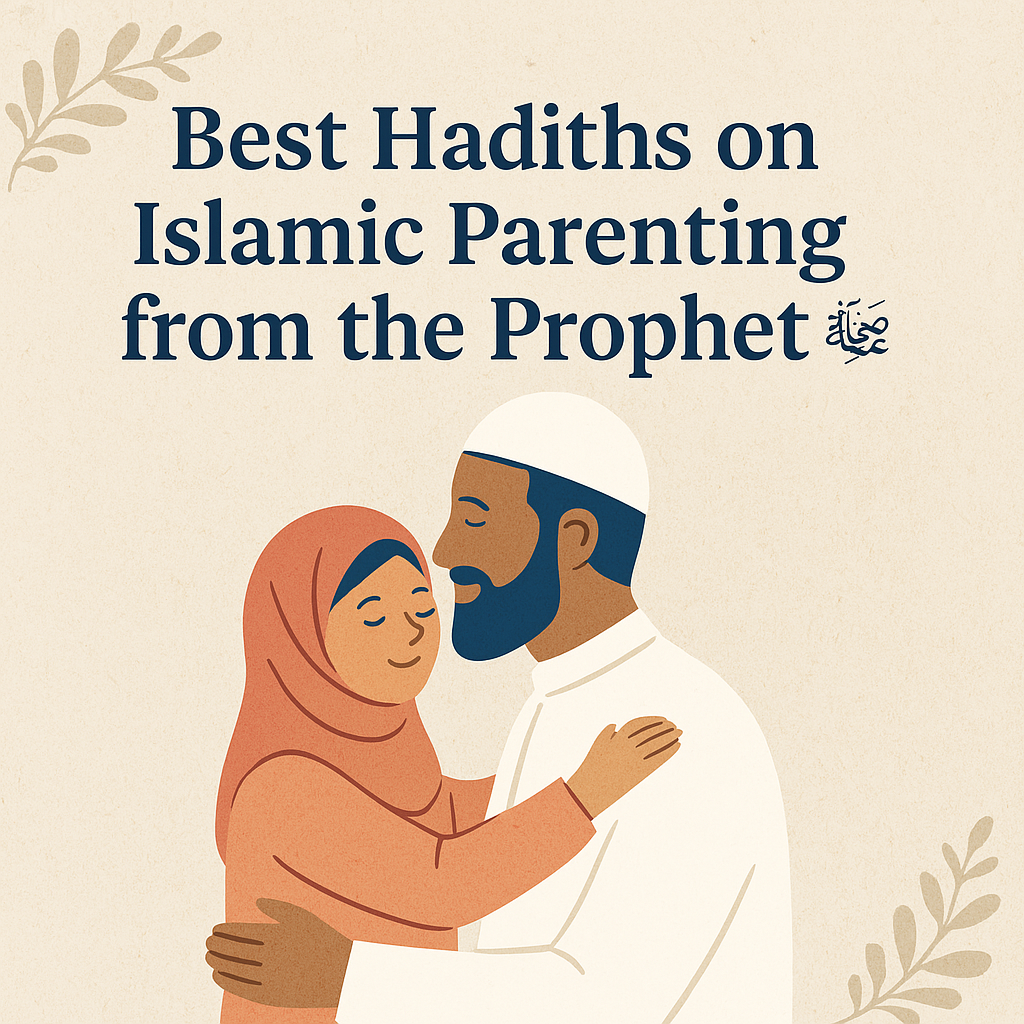
Best Hadiths on Islamic Parenting from the Prophet ﷺ
Parenting in Islam is not merely a social duty; it's a spiritual responsibility and a trust (Amanah) from Allah ﷻ. The Prophet Muhammad ﷺ, through his life and sayings (Ahadith), gave us clear, compassionate, and deeply insightful guidance on how to raise children who are righteous, emotionally intelligent, and close to their Creator. In this article, we explore five powerful Ahadith on parenting children, each explained in depth to help Muslim parents implement them in today’s world.
1. The Three Stages of Parenting
"Play with them for the first seven years, teach them for the next seven years, and advise them for the final seven years."
— Reported by Imam Al-Ghazali in Ihya’ Ulum al-Din
Explanation:
This Hadith provides a powerful, age-appropriate framework that many modern parenting experts now validate through developmental psychology:
- Age 0–7: Play — Children thrive in loving, playful environments. This phase builds emotional security. The Prophet ﷺ emphasized affection and bonding through gentle interaction.
- Age 7–14: Teaching — As intellect develops, children should be taught moral values, Salah (prayer), manners, Qur'an, and Islamic identity. This is the foundation-setting period.
- Age 14–21: Advising — Teenagers crave autonomy. Instead of rigid control, this stage demands respectful dialogue and mentoring, much like a wise friend guiding a peer.
This structure nurtures children into confident, spiritually-grounded adults. Consistency with love is the key throughout each stage.
2. Mercy Toward Children
"He who does not show mercy to our young, nor acknowledges the rights of our elders, is not one of us."
— Sahih al-Bukhari
Explanation:
The Prophet ﷺ was the epitome of gentleness. He publicly kissed his grandchildren, carried them on his shoulders, and shortened prayers when he heard a child cry—contrary to the harshness common in some cultures.
Mercy builds connection. When parents are compassionate listeners and patient caretakers, children feel secure. This emotional safety is essential for developing love for Allah ﷻ, emotional intelligence, and healthy self-worth.
In today's era of mental health concerns, this Hadith encourages parents to replace shouting and scolding with empathy and open communication.
3. Treating Children Equally
"Fear Allah and treat your children equally."
— Sahih al-Bukhari and Muslim
Explanation:
This Hadith was in response to a father giving a gift to one son while excluding others. The Prophet ﷺ refused to witness the act and advised fairness.
Favoritism leads to sibling rivalry, resentment, and emotional wounds that can last a lifetime. Fairness includes not only material things but also love, time, and attention. Justice doesn’t always mean sameness; it means catering fairly to each child’s needs.
This Hadith is particularly relevant in joint-family or patriarchal settings where boys are favored. Islam breaks those norms with this clear instruction.
4. Empathizing With Children
"O Abu Umair, what happened to the little bird?"
— Sahih Muslim
Explanation:
When a little boy’s pet bird died, the Prophet ﷺ comforted him in a personal, tender way. This Hadith, though short, is a gem of prophetic emotional intelligence.
Instead of dismissing a child’s feelings as trivial, the Prophet ﷺ acknowledged his sadness and gave it importance. Modern parenting teaches that validating emotions helps children process grief and builds trust.
Parents should never mock or ignore a child’s sorrow, even if it’s over something small. Connecting with your child at their emotional level strengthens your relationship and teaches compassion.
5. Raising Daughters Leads to Paradise
"Whoever has three daughters, and he accommodates them, shows mercy toward them, and supports them, Paradise is definitely guaranteed for him."
— Musnad Ahmad
Explanation:
This Hadith was revolutionary in a time when girls were buried alive due to shame. The Prophet ﷺ elevated their status, associating their care with eternal reward.
In another narration, he includes two daughters—or even one—showing how accessible this reward is. Raising daughters with love, education, and dignity is a direct path to Jannah (Paradise).
This is a timeless reminder to combat gender bias in Muslim cultures and to treat daughters as the blessings they are, spiritually and socially.
Conclusion
These five Ahadith present a prophetic model of parenting that balances love, fairness, wisdom, and empathy. They are not outdated relics—they are living guidance for today’s Muslim families.
At Alif Quran Academy, we encourage parents to apply these teachings in everyday interactions. Start by nurturing emotional bonds, teaching faith through love, and raising children who are not only pious but kind, just, and emotionally whole.
Parenting is not easy, but with the Prophet’s ﷺ Sunnah as your compass, it becomes a journey filled with barakah and purpose.



